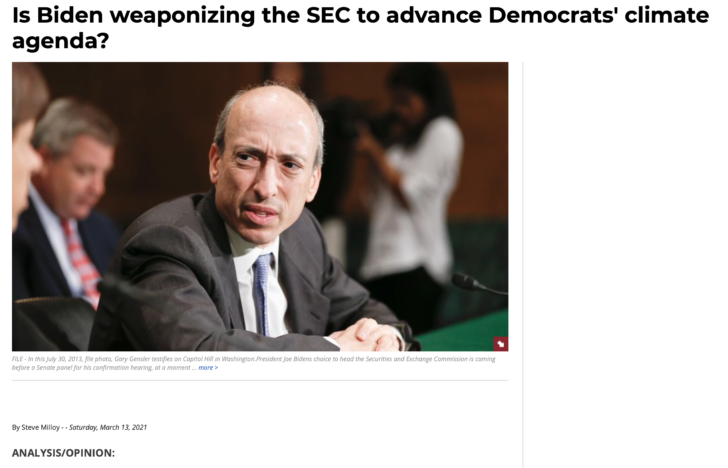My latest in the Washington Times.

The U.S. Securities and Exchange Commission (SEC) recently announced it was taking action to curb false and misleading statements by publicly-owned companies.
While this seems like a promising development on its face, there’s good reason to believe this is a Biden administration effort to weaponize the SEC for the purpose of advancing its climate agenda.
On March 4, the SEC announced that its Division of Enforcement, the part of the agency that polices companies for fraud, was establishing a Climate Task Force. The ostensible purpose is to “identify any material gaps or misstatements in issuers’ disclosure of climate risks under existing rules.”
There are two problems with this mission.
First, publicly-owned companies registered with the SEC have always been required to fully disclose all significant risks to business, whether from standard business and market risks to government regulation, to litigation and even to natural disasters, including those caused by weather.
For instance, in 2010 during the Obama administration, amid the last frenetic press to pass cap-and-trade legislation and damage coal, oil and natural gas industries, the then-Democrat-controlled SEC issued special rules for disclosing risks to business related to climate change. These rules were largely superfluous and duplicative since companies are already under a legal obligation to disclose material risks to business.
In the 10 years since the Obama-era SEC rules were issued, no one has identified any specific failures in disclosure. This is not for lack of trying by climate activists. During the past few years, there has been plenty of litigation by activists and investigations by state attorneys general over corporate climate disclosures.
Virtually all of this has centered around what energy companies “knew” (read “had a few thoughts”) about the effect of emissions on climate during the 1970s through 1990s. Certainly none of it has anything to do any post-2010 disclosures.
Consequently, to the extent the SEC Climate Task Force is focusing on disclosures of climate risks to business, it will likely be a waste of time and effort.
The second and more serious problem is that the SEC could very well overlook the actual dissembling related to climate.
Many companies have gone from merely disclosing climate risks to using climate as a business marketing opportunity.
Some companies now routinely boast that they are taking action to “combat climate change” or to meet the goals of the Paris climate accord or to otherwise somehow save the planet. From oil to airline to tech companies, all now boast about cutting emissions, going carbon neutral by buying carbon offsets or otherwise being “climate-friendly.”
In almost all cases, this is absolutely false and misleading rot, and the SEC has turned a blind eye to it.
No company’s emissions are a significant portion of global emissions. None have a discernible influence on global climate. No company is a signatory to the Paris climate accord. None can meet the agreement’s goals which are stated in terms of average global temperature, not emissions.
Going “carbon neutral” by buying so-called carbon offsets is in most cases a highly dubious if not outright fraudulent proposition. The reasons for this are too numerous to mention here, but suffice it to say that this is the one point that climate alarmists and climate skeptics agree on.
Certainly no company is saving the planet, whatever that means in the first place.
If other corporate disclosures were as false and misleading as corporate climate boasting, the U.S. Treasury would be overflowing with money collected from fines. Recall that the SEC fined Elon Musk $20 million and barred him from being chairman of Tesla for one single false and misleading tweet.
I petitioned the SEC to take action against this sort of actual corporate climate lying in August 2019. So far, the only sound coming from the agency is crickets.
Recently, Goldman Sachs alumnus Gary Gensler, an appointee of the Clinton and Obama administrations, had his confirmation hearing for the SEC chairman’s job with the Senate Banking Committee. With respect to possible further climate disclosure rules, Mr. Gensler told the committee “we will look at what information investors want.”
That, of course, is not the applicable legal standard. Disclosures must be material and not false and misleading. One would think an SEC chairman-designee would know that.
The investors Mr. Gensler referred to are either climate activists pretending to be investors or institutional investors and financial institutions that have been captured by partisan political actors. Wall Street loves climate alarm — not only for the politics but the anticipated green financing boondoggles.
Before the Senate votes to confirm Mr. Gensler, perhaps it could ask him what he plans to do to stop the actual corporate climate prevarication.
Steve Milloy publishes JunkScience.com, served on the Trump-Pence EPA transition team and is the author of “Scare Pollution: Why and How to Fix the EPA.”